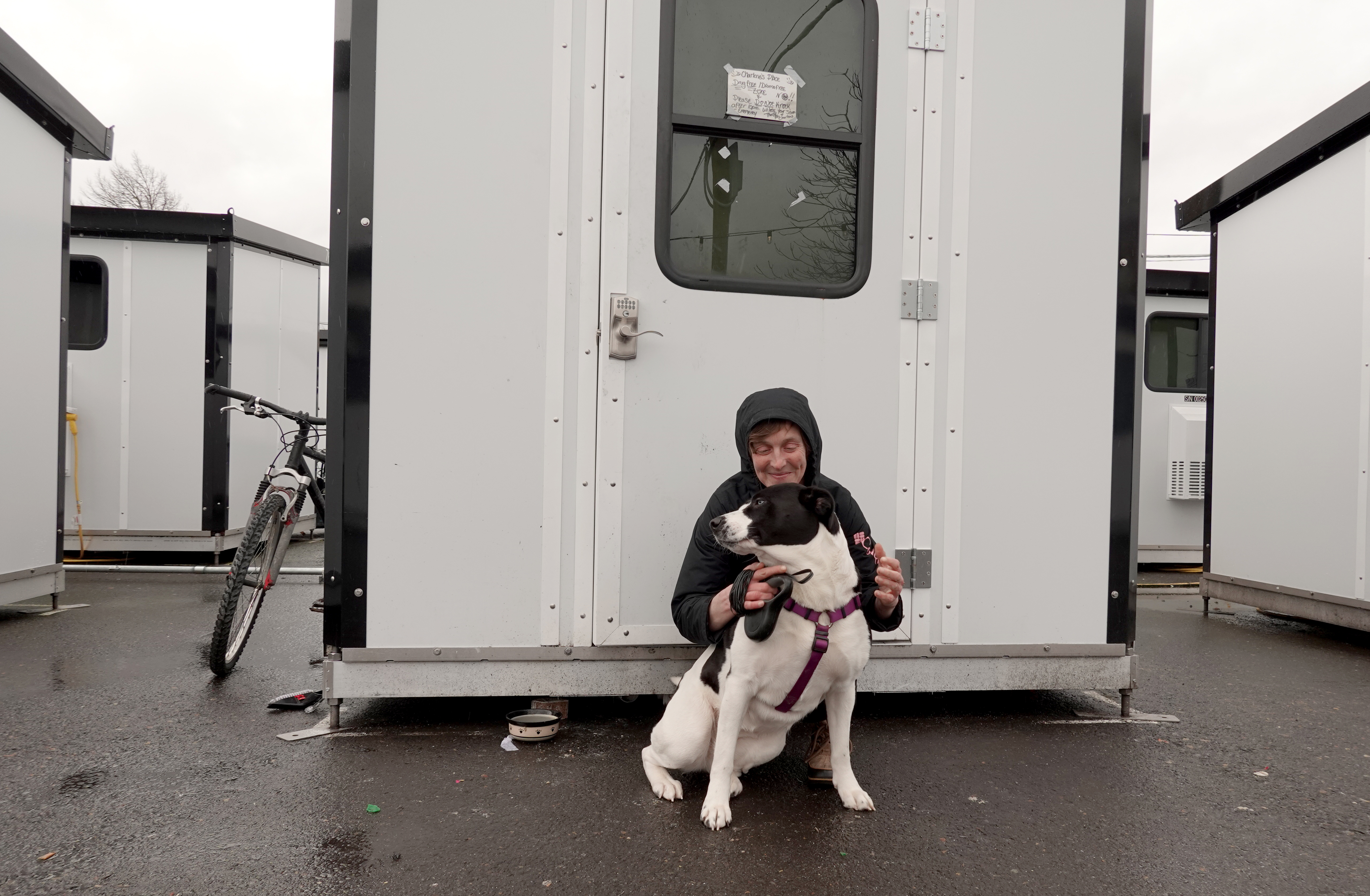
Charlene Brown and her dog, Charlie, sit in front of her sleeping pod at the Clinton Triangle shelter in Southeast Portland, Feb. 27, 2024. Brown has lived at the shelter since July, and is eager to move into permanent housing.
Alex Zielinski / OPB
Charlene Brown has lived in a 10-by-10-foot shed in an industrial lot in Southeast Portland for seven months. It’s one of 160 pods that make up the city-owned Clinton Triangle shelter on a piece of property nestled between the railroad tracks and Southeast Powell Boulevard.
It’s where Brown has made new friends, adopted a dog named Charlie, and daydreamed about moving into permanent housing after a decade on the streets.
It’s also the same place where Brown nearly died.
Two months ago, Brown overdosed after taking meth that was laced with fentanyl, a deadly synthetic opioid. Staff at the shelter had to use the overdose-reversing drug naloxone — often called by the brand name Narcan — on her six times.
“I felt like I just woke up from a nap,” Brown recalled. “I came to and, and am being told the words ‘Narcan’ and ‘died’ and I just remember crying, saying, ‘I don’t understand.’”
Brown has been sober ever since, and attends weekly recovery meetings off-site. But it’s not easy. The Clinton Triangle is a low-barrier shelter, which means people don’t have to be sober to stay there. Guests aren’t allowed to drink or use drugs in public areas, but they do in the privacy of their pods.
Brown said it’s hard to remain sober at the shelter, as it seems to directly contradict with her recovery process.
“The first thing in treatment you learn is you gotta change your people, places and things,” said Brown. “But it’s a challenge, because I’m living in, in the place where I OD-ed. I’m freaking surrounded by the people that are using [drugs], and I can’t make them stop.”
Brown has been on a waiting list for a sober housing program since her overdose. But she still hasn’t moved out of the shelter.
Leaders at Clinton Triangle say that the key to their program’s success is offering residents the help they need to better their lives when they’re ready for it. For people like Brown, that’s a change of scenery. But those options are limited in Portland, where long-term funding for housing and addiction treatment programs are hard to come by.
As the city moves to expand shelters like Clinton Triangle that reach people who may be turned away from more traditional shelters, addiction experts believe it’s important that they’re matched with the housing and support needed to truly leave homelessness behind.
“I’m just waiting,” said Brown. “Nervously waiting.”
A new model
The origins and operations of the Clinton Triangle shelter have been baked in controversy. Plans for the shelter were first announced by Mayor Ted Wheeler in late 2022 in tandem with a polarizing plan to ban street camping citywide. While the camping ban was delayed by legal challenges, the shelter plan remained on track — but not without opposition. People experiencing homelessness and advocates raised concerns about the scale of the shelters, which are far larger than any other city-run shelter. Wheeler eventually offered the hefty contract to a California-based organization called Urban Alchemy. The shelter opened in late July 2023.

FILE - Portland politicians, with Mayor Ted Wheeler at the podium at a media event in July 2023, preview the first large-scale alternative shelter at the Clinton Triangle in Southeast Portland.
Alex Zielinski / OPB
Since its founding in 2018, Urban Alchemy has managed shelters and conducted street outreach in Los Angeles, San Francisco and Austin. It focuses on hiring people who have lived experience with addiction, homelessness and incarceration. That resonates with some residents.
Tawshina Adams, a care coordinator at Urban Alchemy, is responsible for checking in with 20 shelter residents regularly to make sure they are getting connected to services they need. Adams was once homeless herself and said her background makes it easier for some residents to trust her.
“It’s basically how I am capable of doing my job,” Adams said during an interview at Clinton Triangle in late February. “We don’t want to overwhelm guests. When they know that you’ve been where they are, that really matters.”
Related: Who is the California group bidding to operate homeless shelters in Portland?
But Urban Alchemy brought its own baggage to Portland. The nonprofit has been the target of numerous lawsuits, alleging civil rights violations, physical and sexual harassment, and accusations of wage theft from staff. Urban Alchemy has settled most of these lawsuits out of court. Most recently, two Urban Alchemy staff based in San Francisco accused their supervisor of sexual harassment. That supervisor was transferred to the Clinton Triangle in January, following those complaints.
Kirkpatrick Tyler, Urban Alchemy’s chief of community and government affairs, said that the nonprofit takes any allegations of misconduct against staff “devastatingly serious” and investigates them thoroughly. The organization has denied all accusations.
Reducing barriers, reducing harm
This shelter is not only unique for its size, but for what it allows. Many local shelters require sobriety, ban pets, prohibit couples from staying together, and have strict curfews. These rules can deter many people from seeking help. That’s not the case at Clinton Triangle.
“We tried to get rid of the stuff that kept people from coming inside,” said Adams.
Clinton Triangle is considered a low-barrier shelter because guests can stay with their pets and partners, and can come and go whenever they want. They’re also not expected to be sober while staying there. Residents say that most guests are using drugs inside their pods on a regular basis.

A cluster of sleeping pods at the Clinton Triangle shelter on Feb. 27, 2024. The shelter is the city's largest, offering space to more than 200 guests.
Alex Zielinski / OPB
Shelter staff knock on guests’ doors throughout the day to conduct wellness checks, visits that have led to many overdose reversals. According to Portland Fire and Rescue data, paramedics have been called to the shelter 24 times to respond to overdoses between July 2023 and April 2024. Urban Alchemy says that no one has died from an overdose at the property.
This gives guests a sense of security that they never felt on the street.
“We feel safe using here,” said Kaleena, who moved into Clinton Triangle with her boyfriend in early March. “It’s one of the biggest things for us.”
Kaleena and several other shelter residents who spoke with OPB declined to share their last names out of privacy concerns. When Kaleena and her boyfriend lived out of a van in Southeast Portland, she said, they’d frequently be harassed and threatened by people trying to steal drugs or money to buy drugs — or by people who appeared to be in a drug-induced psychosis. Urban Alchemy has a no-tolerance policy for violence, meaning any violent guest will be immediately evicted.
“That changes everything,” said Kaleena.
In many ways, Clinton Triangle could be considered a harm reduction model. Harm reduction is a term for programs that reduce the negative — and often deadly — consequences associated with drug use.
It’s a concept used to describe programs that distribute clean syringes or the overdose medication naloxone. It’s also a term used for safe injection sites, facilities where people can legally use hard drugs like fentanyl under the watch of medical professionals who can reverse overdoses.
Avik Chatterjee is an addiction medicine physician at Boston University who focuses on treating people experiencing homelessness. He said harm reduction is simply valuing the lives of people addicted to drugs over stigmatizing their addiction. It’s also being able to swiftly offer people what they need — whether that’s housing, treatment or other medical care — to help them move past addiction.
“If you can keep people alive while they’re going through whatever they’re going through and help folks get onto the next thing in their life, that’s crucial,” he said.
That’s not dissimilar to the work being done by Urban Alchemy staff. But Tyler said they don’t consider their work harm reduction. He instead characterized the shelter as a “healing space.”
“I don’t know that we get to call ourselves harm reduction,” he said. “We’re just not othering and criminalizing people for challenges that they have and we’re not making them homeless because they’re struggling in addiction.
“We create spaces where people can safely work through their experience and have a support system that can connect them to what’s next, when they’re ready for what’s next.”
Related: How fentanyl and social isolation have worsened youth homelessness in Oregon
Addiction experts agree that the Clinton Triangle falls short of offering true harm reduction, because of the inability of the program to always connect people to that next step. Since January, the shelter has been unable to offer most residents permanent housing. Space in local drug treatment facilities has been equally limited.
“It is really key to have a good off-ramp,” said Chatterjee. “If you set up these programs and you don’t have a way for folks to move into permanent supportive housing, that is going to result in a problem.”
Chatterjee said it’s critical that people in low-barrier shelters are able to move into housing or treatment after an overdose when they’re ready. If that option isn’t ready for them, those people could lose trust in the system, pushing them further away from leaving homelessness behind.
Money problems
This has become the case for some at the Clinton Triangle.
The shelter was initially pitched as a temporary place for people moving from unsheltered homelessness into permanent housing. In October, the city was granted $3.6 million from the state, funneled through Multnomah County, to cover up to a year’s rent for people ready to move into their own place.
Through the rental program, administered by local homeless services nonprofit Do Good Multnomah, Portland has moved a little more than 100 people into housing. But that money dried up in January. For nearly three months, most shelter residents seeking housing were told there was no money left to help them.
“I feel left behind,” said Maria, who moved into the Clinton Triangle the second day it was open. “I don’t want to be living like this forever.”
Maria, who uses a wheelchair due to knee pain, became homeless after fleeing an abusive relationship and used drugs to treat her mental and physical health. She asked OPB not to use her real name out of concern for her safety.
Since moving into the shelter, Maria has dreamed of moving into permanent housing, but she has been continuously told to wait until there’s enough money available. In the meantime, she’s seen at least one close friend overdose. She doesn’t want to be next.
“I want to get clean someday,” said Maria. “I can’t get clean here, there’s no way. Drugs are everywhere.”

Michael Jones stands in a community room at his apartment complex in Portland's inner eastside, March 1, 2024. Jones moved from the Clinton Triangle shelter into a studio apartment in November, where his rent is paid for an entire year.
Alex Zielinski / OPB
Michael Jones considers himself lucky. Jones was able to use state funding to move into his own furnished studio apartment in Northeast Portland in November, before the money was used up. Since moving, he got a job as a cook and has been able to regularly attend alcohol recovery meetings and work on his sobriety.
“I go to the meetings and I have three or four different mentors I talk to,” Jones said. “Everybody says I’m doing so good.”
He said this would have been a lot harder to accomplish while living at a shelter, where he was surrounded by drug and alcohol use. But knowing he was on the path toward stable housing helped make his time at Clinton Triangle manageable.
“As soon as I moved into my pod, they said, ‘This is temporary. We’re going to help you find housing and get into programs,’” Jones said. “And they did that.”
But the system that brought Jones success has been on pause for months at the Clinton Triangle.
A short-term fix
There is some hope. After months of discussion, the city and Multnomah County reached a short-term funding plan last week. The county identified just over $1 million to cover a year’s rent for 52 households at Clinton Triangle. That money comes from the supportive housing services measure, a regional tax meant to fund services that help keep people out of homelessness. While this tax has been unexpectedly flush with cash, the county has placed strict boundaries around what programs will be funded each year.
There’s no plan for what happens when the funding to cover 52 housing placements runs out.
Both the city and county pointed to their new joint plan to reduce unsheltered homelessness in the metro region as a potential solution. That plan strives to move nearly 3,000 people out of homelessness into shelter or permanent housing by the end of 2025 by investing in new shelter facilities, rent support, and drug treatment programs. Both governments are still finalizing the details of that strategy, which they say could establish a formal funding stream for housing people as they leave shelters.
According to county spokesperson Julia Comnes, Multnomah County Chair Jessica Vega Pederson is looking into ways to fund this type of housing through the county budget for the next fiscal year, which begins in July.
All agree that a longer-term plan is critical for the longevity of the city’s new low-barrier shelter sites, especially as the region’s unsheltered population continues to grow.
The Clinton Triangle is the first of six planned large-scale outdoor shelters, dubbed Temporary Alternative Shelter Sites, that Portland plans to open. The city has no timeframe for opening the remaining five shelters, and has struggled to locate property for future locations. But Mayor Wheeler is focused on establishing the new shelters before he exits office at the end of the year. In the interim, the city has begun to expand their smaller outdoor shelters, called Safe Rest Villages, with the Clinton Triangle shelter as a model.
Brandy Westerman oversees the city’s shelter programs, including the Clinton Triangle and Safe Rest Villages. She’s worried that not investing in housing for people in shelter will only exacerbate the growing clog in a system lacking housing options.
“Right now we still have thousands of people who don’t even have shelter, not to mention those that are in shelter now needing that support,” said Westerman in February. “So it’s going to take a longer investment.”

The entrance to the Clinton Triangle shelter in Southeast Portland on Feb. 27, 2024. Guests are allowed to park their cars and other transportation outside the shelter.
Alex Zielinski / OPB
But back at Clinton Triangle, Urban Alchemy’s Tyler is worried the money won’t materialize and residents who have already been let down by social service providers in the past will feel misled.
“Whether it’s our responsibility or not, people are going to hold us accountable for it, right?” Tyler said. “We do have it at the forefront of every conversation, we say, ‘We’re at capacity. We’ve housed this many folks … where do we go from here?’”
Newcomers at Clinton Triangle are already hesitant to trust the program’s promises.
Megan moved into the shelter in March, after spending two years living in a tent. She said she’s relieved to have access to a shower and a warm bed. She’s wary of the promise of permanent housing.
“I’m meeting people here who have been here since it opened,” she said. “That’s not encouraging.”









